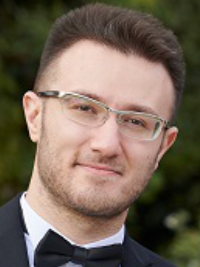Amin Javidanbardan received his Bachelor’s Degree in Chemical Engineering from Tehran Polytechnic (Tehran, Iran), followed by his Master’s degree in Chemical and Biological Engineering (CBI) at University of Erlangen-Nuremberg (Erlangen, Germany). His thesis was entitled “Experimental investigations of protein refolding on chromatographic ion-exchangers.” The initial idea of his thesis was to refold denatured proteins on the ion-exchange chromatographic media and simultaneously, to separate impurities and various states of the protein, based on different electrostatic interactions. After completing his Master’s degree, he worked as a research assistant in Institute of Particle Technology at University of Erlangen-Nuremberg in a project related to electrospray–differential mobility analysis- mass spectrometry (ESI-DMA-MS) and electrospray scanning mobility particle sizer (ES-SMPS) ESI-SMPS examining the impact of solvent composition on the ESI process using macromolecules such as proteins as solutes. Obtaining enough research experience in Germany, he returned to Iran and continued his career as a research assistant at Pasteur Institute of Iran, Production and Research Complex, where he supervised and conducted projects related to upstream and downstream processing of recombinant hepatitis B surface antigen (rHBsAg) expressed in Pichia pastoris. So far, he had published more than ten research papers in this field of pharmaceutical bioprocess development in both areas of fermentation and downstream processing. Recently he has joined CODOBIO International Training Network (ITN) and has been awarded a Marie Skłodowska-Curie actions Ph.D. fellowship under the supervision of Dr. Ana M. Azevedo and Prof. Joao Pedro Conde.
Research focus:
Microfluidic Devices for Continuous Chromatography of Biologics.
Short description of project:
I mainly focused on developing and characterizing miniaturized chromatography systems for bioprocess development. In the first phase of this project, we developed a simple, low-cost integrated microchromatographic column (26 μl) with the possibility of operation under continuous flowthrough conditions. In the second phase of this study, as part of my secondment at UCL, we implemented the robotic liquid handling system to assess the possibility of replacing current conventional resins with multimodal resins.
What new skill/skills did you learn?
I have gained a broad spectrum of skills in this project. Regarding experimental work, learning micro- and nanofabrication methods, performing robotic liquid handling and running various analytical and lab-scale downstream process operation units. In terms of software and simulation, I have learned computational fluid dynamics (CFD) simulation, LabView software development, Evoware and Synthace digital experiment platform for performing experiments in robotic liquid handling system; I also deepened my knowledge in Design of Experiment (DOE) and data analytics.
What did you enjoy most about your project?
Having a systematic training program, performing part of research in other partner universities, presenting our progress to other partners, and getting feedback from them.
What do you believe is your biggest contribution to the scientific community?
It was the fact that further miniaturization of chromatography for bioprocess development with simple and cost-effective microfabrication techniques such as micromilling technology is possible. Besides, integrated impedance microsensor could provide more information about sample and solution characteristics than the current lab-scale units.
What would your advice be for future Early-Stage Researchers at the start of their project?
Figure out what skills you need to improve for your research, get out of your comfort zone, and start working on them from the beginning. Be as critical as possible in your research. Your first approach to solving the research problem might not be the best one. So do not become frustrated and disappointed if it does not work. Try to develop new ideas with more literature reading and interaction with other researchers. While performing your research, continuously re-examine your ideas and determine if you can improve them. Try to maximize your network with other researchers in partner institutes. This would be beneficial not only for your research but also for your future career by knowing the future professionals in your field.
What do you plan next?
Starting my Ph.D. study at Pennsylvania State University. I will work on a similar project to CODOBIO, but this time it is developing continuous downstream processing of mRNA. This project is funded by FDA with collaboration among MIT, Penn State, Rensselaer Polytechnic, and Bioartheta biotechnology company.



